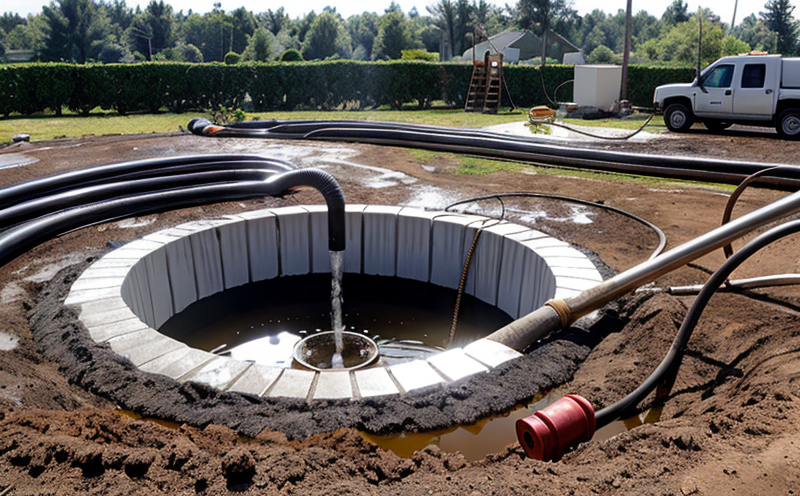Geothermal piping system inspection
The integrity and performance of geothermal piping systems are critical components in harnessing the earth's natural heat. These systems play a pivotal role in sustainable energy generation, and their proper functioning is essential for both environmental protection and economic efficiency. Geothermal systems typically consist of pipes installed deep underground that transfer heat from the Earth to a surface facility where it can be used for power generation or heating purposes.
Inspecting these piping systems ensures long-term reliability and safety. Over time, thermal stress, ground movement, and corrosion can compromise the integrity of geothermal pipes, leading to leaks, reduced efficiency, and potential environmental hazards. Regular inspections are necessary to identify and address issues before they escalate into significant problems.
At Eurolab, our team of experts specializes in inspecting geothermal piping systems using advanced non-destructive testing (NDT) techniques that allow for the evaluation of pipe integrity without causing damage to the system. This service is particularly important given the complex and often inaccessible nature of these installations.
Our inspection processes are designed to meet international standards such as ISO 9712, EN 473, and ASTM E1065, ensuring that our evaluations are both comprehensive and compliant with industry best practices. By leveraging cutting-edge technology and experienced personnel, we provide accurate assessments of the condition of geothermal piping systems.
The inspection process involves several key steps: preliminary site assessment, preparation of the system for testing, application of NDT methods (such as ultrasonic testing or radiography), data analysis, and detailed reporting. The results of these inspections are crucial for decision-making processes regarding maintenance schedules, potential repairs, and overall system optimization.
Understanding the specific challenges faced by geothermal installations allows us to tailor our inspection procedures to meet the unique requirements of this sector. Our expertise in energy systems and environmental surveillance ensures that we deliver reliable and actionable insights into the condition of your geothermal piping system.
Why It Matters
The integrity of geothermal piping systems is not only crucial for the efficient operation of geothermal plants but also critical for environmental protection. These systems are responsible for transporting high-pressure fluids and gases, which can be highly corrosive if not properly maintained. Any leakage or failure in these pipes could lead to significant financial losses, environmental damage, and safety risks.
Regular inspections help prevent such incidents by identifying potential weaknesses early on. This proactive approach ensures that any necessary repairs or replacements are carried out before they become critical issues. By maintaining the integrity of geothermal piping systems, we contribute to the sustainability and longevity of energy infrastructure while minimizing disruptions and costs associated with unexpected failures.
From an environmental perspective, a well-maintained geothermal system reduces the risk of groundwater contamination and ensures that resources are used efficiently. This aligns with broader goals of sustainable development and responsible resource management. For quality managers and compliance officers, regular inspections provide essential data for meeting regulatory requirements and ensuring best practices in energy production.
In summary, inspecting geothermal piping systems is vital for operational efficiency, cost savings, environmental protection, and safety. It underscores the importance of proactive maintenance strategies in the context of sustainable energy solutions.
Scope and Methodology
| Aspect | Description |
|---|---|
| Preliminary Site Assessment | Our team conducts a thorough inspection of the geothermal piping system, reviewing existing documentation and assessing environmental conditions that may impact testing. |
| System Preparation | The area around the pipes is prepared to ensure safe access for our inspectors. This includes clearing debris and isolating the pipe sections to be inspected. |
| Non-Destructive Testing (NDT) | We employ various NDT methods such as ultrasonic testing, radiography, and magnetic particle inspection to assess the internal and external condition of the pipes. These techniques are chosen based on the specific requirements of each project. |
| Data Analysis | Inspection data is meticulously analyzed using advanced software tools to identify any signs of wear, corrosion, or other defects that could compromise system integrity. |
| Detailed Reporting | A comprehensive report is prepared summarizing the findings and recommendations for maintenance actions or repairs. This report serves as a valuable resource for decision-making by stakeholders involved in the geothermal project. |
Eurolab Advantages
At Eurolab, we pride ourselves on delivering high-quality inspections that are reliable and aligned with international standards. Our team of experts brings extensive experience in the energy sector, ensuring that our services meet the highest level of quality and accuracy.
We offer several key advantages:
- Comprehensive Expertise: Our inspectors have specialized knowledge in geothermal systems, allowing us to provide tailored inspection solutions for your specific needs.
- Advanced Technology: Utilizing state-of-the-art NDT techniques and equipment ensures that we capture the most accurate data possible.
- Compliance with Standards: Our inspections are conducted in accordance with international standards such as ISO 9712, EN 473, and ASTM E1065, ensuring compliance with industry regulations.
- Proactive Approach: By identifying potential issues early, we help prevent costly repairs and downtime for your geothermal system.
- Detailed Reporting: Our comprehensive reports provide clear insights into the condition of your piping systems, supporting informed decision-making by quality managers and compliance officers.





